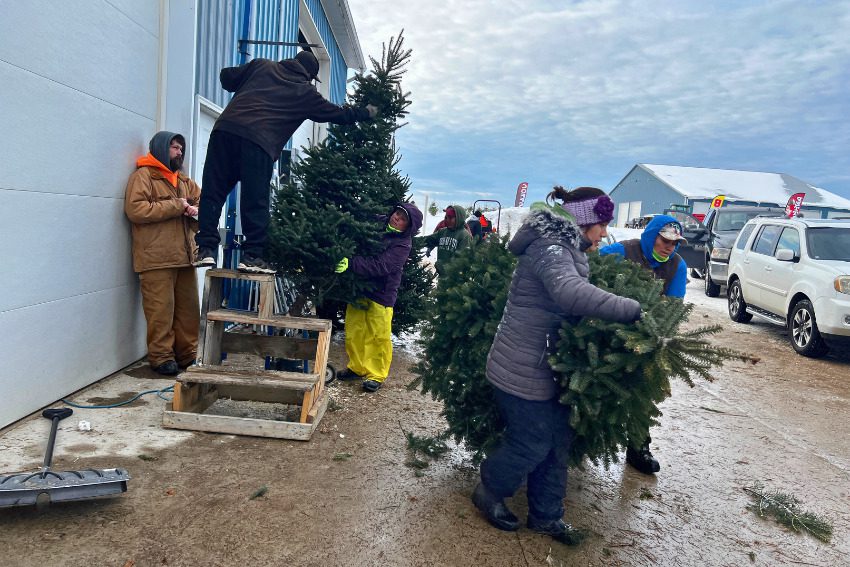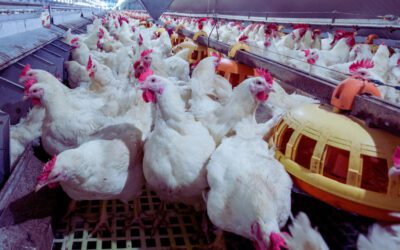
(Grostic Cattle Company via Facebook)
State officials are confident that new regulatory controls will prevent PFAS-contaminated biosolids from being spread on more Michigan farms. But farmers want more testing—and federal resources—to ensure their livelihoods are protected.
MICHIGAN—Jason Grostic didn’t expect to be the last generation to run his century-old cattle farm in Livingston County. But after state officials learned that his fertilizer had been slowly poisoning his farm for longer than a decade, Grostic said he wasn’t left with many options.
He likened his situation to being diagnosed with a form of terminal cancer.
“It’s because you know you’re dying, but you don’t know when exactly it’s going to happen,” Grostic told The ‘Gander this month. “But before this is all over with, we will not have a farm.”
January will mark two years since Grostic Cattle Co. in Brighton was effectively shut down by state regulators after they found toxic, per-and-polyfluoroalkyl substances—also known as PFAS—in beef that was sold by the farm. An advisory issued by the Michigan Department of Agricultural and Rural Development (MDARD) last year warned of a “public health risk” tied to meat that Grostic sold at the local farmers market, as well as to childcare centers and schools.
The sensational nature of the subsequent headlines may have been enough to put Grostic out of business, but an order from the state sealed the deal—mandating his cattle and products stay put, and that his entire herd be seized (and likely destroyed) before the end of December.
And without savings big enough to help keep his family farm afloat for much longer, Grostic said he hopes his inevitable bankruptcy will motivate state and federal lawmakers to take action by providing more resources for testing and assistance for farmers impacted by contamination.
“We’re broke,” Grostic explained. “Two years later, and I still haven’t been able to earn a single dollar. I’ve already lost all of everything that I’ve ever earned, everything that I’ve ever put away for retirement—that’s all gone. … It’s only a matter of time before this issue gets worse.”
What are PFAS?
PFAS are a group of synthetic chemicals that were designed to repel oil and water, for temperature resistance and friction reduction for a wide range of consumer and industrial products—including as coatings for paper products and cookware and in firefighting foams.
Scientists have dubbed PFAS as “forever chemicals” because they take thousands of years to break down and can accumulate in soil, water, plants, animals, and people over time.
Research from Michigan State University Extension shows that the food supply is one of the many ways in which PFAS can spread to humans, who can then suffer from a variety of health complications—including cancer, increased cholesterol, and thyroid disease.
How bad is it?
Michigan has been billed among the leading states in recognized PFAS contamination sites, which researchers have attributed, in part, to the state government’s comparatively aggressive approach toward testing and monitoring contamination sites. That includes seven state agencies coming together to form the Michigan PFAS Action Response Team in 2017.
State regulators are actively tracking at least 295 PFAS-contaminated sites across more than half of Michigan’s 83 counties—including at landfills, manufacturing facilities, airports, military bases, and other locations where the chemicals have been used or dumped since the 1940s.
State data shows the majority of those sites, so far, have been identified in Kent, Oakland, Kalamazoo, Muskegon, Wayne and Genesee counties—with each tracking at least a dozen contaminated properties. The sheer extent of the pollution has caused some researchers and activists to label the situation as Michigan’s biggest environmental crisis in at least 40 years.
How do PFAS get onto farmland?
There are many ways in which farms can become contaminated with PFAS.
Among them: When farmers spread contaminated biosolids on their land as fertilizer.

Biosolids are a product of the wastewater treatment process in which human waste is separated and treated to produce a semi-solid, nutrient-rich sludge that can then be hauled off from municipal treatment plants and trucked over to farms—often for free—to be used as fertilizer.
The EPA estimates that about 7 million tons of biosolids are generated by 16,000 wastewater treatment facilities every year—with about 60% of it used as fertilizer on farmland. More than 100 wastewater plants in Michigan actively supply biosolids to Michigan farmers.
Without adequate treatment systems in place, those biosolids (like many other things) can become contaminated with PFAS, often because of industrial manufacturers dumping toxic waste down the drain. And without government regulation to mandate testing and treatment at wastewater plants, literal tons of potentially contaminated sludge has been shipped to farmers in the US who may have unknowingly poisoned their own land—in some cases, for decades.
How bad is it?
Michigan’s state regulators first started testing biosolids for PFAS in 2018 with a study that identified five wastewater treatment plants with elevated levels of PFAS contamination in their biosolids—including a sewage plant in Wixom that had been contaminated with toxic PFAS effluent from nearby Tribar Manufacturing, a chrome plating company that makes auto parts.
Regulators promptly prohibited toxic sludge from those plants being spread on farmland, and officials set up a plan to test 30 different sites where the biosolids had been used as fertilizer.
Of those 30 sites selected for testing, a dozen were flagged for being contaminated with PFAS.
Among them: Grostic’s farm, which had been using biosolids from the sewage plant in Wixom.

Jason Grostic carries a calf at his farm in Brighton. (Grostic Cattle Company via Facebook)
State officials told The ‘Gander that Grostic Cattle Co. is the only farm in Michigan that has received a seizure order related to the use of PFAS-contaminated biosolids to date—and that regulatory controls put in place since 2018 have ensured that all sludge from wastewater treatment plants is tested (and reported to state officials) before it makes its way to farmland.
A spokesman for the Department of Environment, Great Lakes, and Energy (EGLE) also described the contamination and subsequent shutdown of Grostic’s farm as a one-off situation—and one that won’t happen again due to current regulatory controls over biosolids.
“It was a very unique circumstance—a very unfortunate circumstance, but based on everything we’ve seen so far, very unique,” said EGLE spokesman Scott Dean. “When you find these concentrations, you do need to act. And I think we’ve been able to identify and act in this case.”
What’s the problem?
With an inability to raise cattle or harvest feed on his land, Grostic said he’s limited on the ways he can repurpose his farm for other agricultural uses, and he can’t afford to shop around for another 400-acre parcel of land to rebuild his century-old family cattle farm from scratch.
The state has been paying for the feed for his herd since the shutdown, and has since offered what Grostic described as “pennies” for his cattle after they’ve been trucked away from his farm.

(Grostic Cattle Company via Facebook)
But he doesn’t expect the buyout will save his family from bankruptcy, and has since filed a lawsuit against Tribar, which reportedly seeks “tens of millions” of dollars in compensation.
“You can’t take a farmer and serve him a seizure notice and shut him down and expect him to do business forever without a paycheck,” Grostic said. “Only in agriculture can somebody get screwed so hard. This would never happen in the automotive or construction industry.”
Grostic joined farmers from Maine and New Mexico at a press conference last month in East Lansing to urge Congress to pass legislation that would offer restitution to farmers—like him—who have had their family farms crippled as a direct result of PFAS contamination, as well as to provide more resources for ramping up testing for PFAS on farmland across the country.
The order of those two demands, however, is critical.
More Testing
Despite the optimistic outlook from Michigan’s state regulators, Grostic said he isn’t convinced that he’s the only farmer in Michigan dealing with dangerous levels of PFAS on his farm.
Other states—like Maine—have uncovered dozens of contaminated farms. And with more than 10,000 other, untested sites across Michigan where potentially contaminated biosolids may have been applied, environmental advocates suspect more testing would reveal more problems.
“We really don’t know how bad the problem is in Michigan because we’re not testing to find out,” Sandy Wynn-Stelt, co-chair of the Great Lakes PFAS Action Network told The ‘Gander. “I don’t think Jason Grostic is the only farmer with this issue. I think that would be naive to think that.”
Dean, the MDARD spokesman, confirmed that state regulators have no plans to conduct any additional testing for PFAS on any more farms where biosolids have been used, and noted that the “scattershot” process of testing thousands of farms can be time consuming and expensive.
Moreover, officials are confident in regulatory controls put in place to prevent the contamination.
“We identified where the biggest areas of concern were and started there. We get calls like: Why haven’t you tested 100,000 farms? Well, that’s a lot of money and a lot of resources and we should be focused on the areas where we know we should be most concerned,” Dean said.
Protections for Farmers
But before more problems can be found, farmers want to ensure their livelihoods are protected.
“I don’t want any more testing until we can protect our farmers,” Wynn-Stelt explained. “I see how hard our farmers work, and it’s not fair for them to lose everything they worked for—sometimes for generations—because they were told biosolids would be safe to use.”
Grostic, Wynn-Stelt, and other farmers are specifically calling on Congress to wrap legislation known as the Relief for Farmers Hit with PFAS Act into the federal farm bill, which was extended by one year under a stop-gap budget measure signed by President Joe Biden this month.
The bill—which has since garnered support of US Rep. Elissa Slotkin—would reportedly allow states to apply for competitive grant funding that would provide farmers who have discovered PFAS contamination with a financial safety net to cover things like testing, filtration, income replacement, health care, and, if necessary, funds to help farmers relocate to a new property.
For now, Grostic would be the only farmer in Michigan eligible for assistance. But Adam Nordell, a farmer and campaign manager for Defend Our Health, said the bill is a necessary precaution should more robust testing reveal a more widespread problem affecting Michigan’s farmers.
“We want to send the message to Michiganders that the contamination of farmland with PFAS chemicals is a national issue, and we know that Jason Grostic isn’t alone in Michigan,” Nordell said. “There are probably lots and lots of farms that have been spread with sludge in Michigan. The fact that others haven’t been publicly identified as a problem doesn’t mean that they’re not still living with ongoing exposure to the chemicals and that their businesses aren’t at risk.”
He added: “We need a better approach to this than letting our farms go bankrupt.”
State Support
While advocates wait for congressional action, Defend Our Health is also pushing for state lawmakers in Michigan to follow Maine’s lead and set aside funding to help farmers like Grostic—and any other potentially contaminated farms that may be impacted by PFAS.
“When you look at what Maine has done for their farmers, and what Michigan hasn’t done, it’s appalling,” Grostic said. “It’s only a matter of time before it breaks loose. The can of worms is just being opened up. And when it finally does break loose, and all these farmers find their land is contaminated and you shut that down, it’s going to be a disaster—just a total disaster.”
Nordell said his group is also encouraging Gov. Gretchen Whitmer’s administration to stop the manufacturing and ban the use of more products that contain PFAS in Michigan—including with legislation introduced this year that would ban the chemicals from being used in food packaging.
Tribar, for its part, has reportedly installed filtration to capture PFAS from its discharge and has claimed in court that it stopped using products that contain PFAS altogether in 2015.
Attorney General Dana Nessel has also worked to hold other polluters accountable for cleaning up PFAS contamination, and redressing the subsequent damage done to local communities.
In 2020, Nessel filed the state’s first PFAS-related lawsuit against 17 alleged PFAS manufacturers. That resulted in a settlement this year that led to a site cleanup. Litigation against several other companies that caused PFAS contamination is also ongoing.
READ MORE: Feds take steps to clean up chemicals at former Michigan Air Force base
For the latest Michigan news, follow The ‘Gander on Twitter.
Follow Political Correspondent Kyle Kaminski here.
Support Our Cause
Thank you for taking the time to read our work. Before you go, we hope you'll consider supporting our values-driven journalism, which has always strived to make clear what's really at stake for Michiganders and our future.
Since day one, our goal here at The 'Gander has always been to empower people across the state with fact-based news and information. We believe that when people are armed with knowledge about what's happening in their local, state, and federal governments—including who is working on their behalf and who is actively trying to block efforts aimed at improving the daily lives of Michigan families—they will be inspired to become civically engaged.


Fresh food, stronger farms: Michigan invests millions to support local agriculture
A new ‘Farm-to-Family’ grant program aims to connect Michigan farmers with more consumers, boost local economies, and build a stronger food system....

Rooted in Tradition: How Michigan’s Christmas tree industry is keeping the holiday spirit alive
Family farms—and traditions—help Michigan produce more Christmas trees than almost every other state in the country. GOBLES—Under a clear December...

How Gen-Z is helping rural Michiganders turn out to vote in the UP
Michigan is one of several critical swing states in this year’s election, and for Carly Sandstrom, a Marquette native and canvasser with the...

3 rural communities in Michigan got remote blood pressure care—and the results were dramatic
A pilot program helping rural Michiganders monitor their blood pressure led to big improvements—could this be what finally helps bring down the rate...

Report: Project 2025 would ‘devastate’ Michigan’s rural communities
Republicans’ Project 2025 agenda aims to enact a far-right agenda that would hurt all Michiganders, especially those living in rural communities,...







